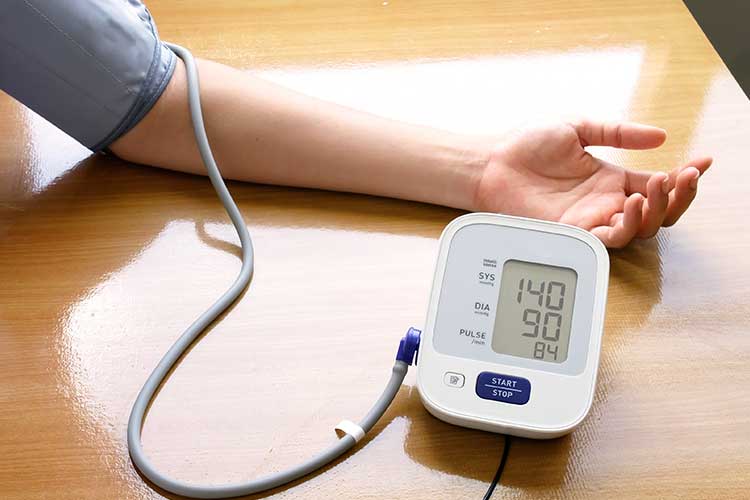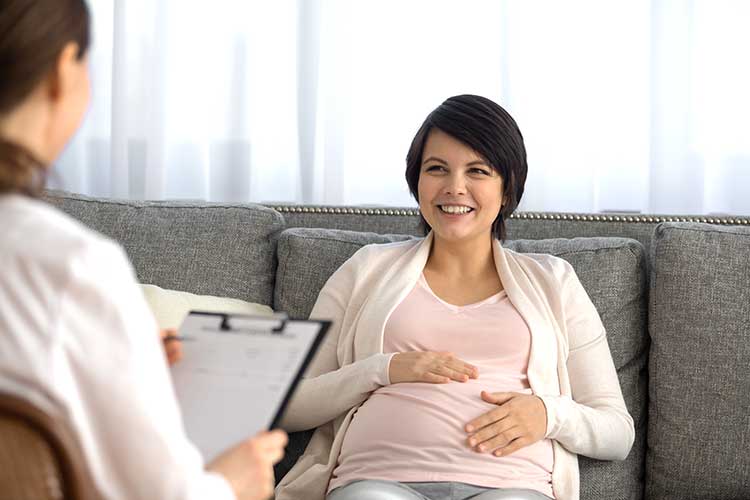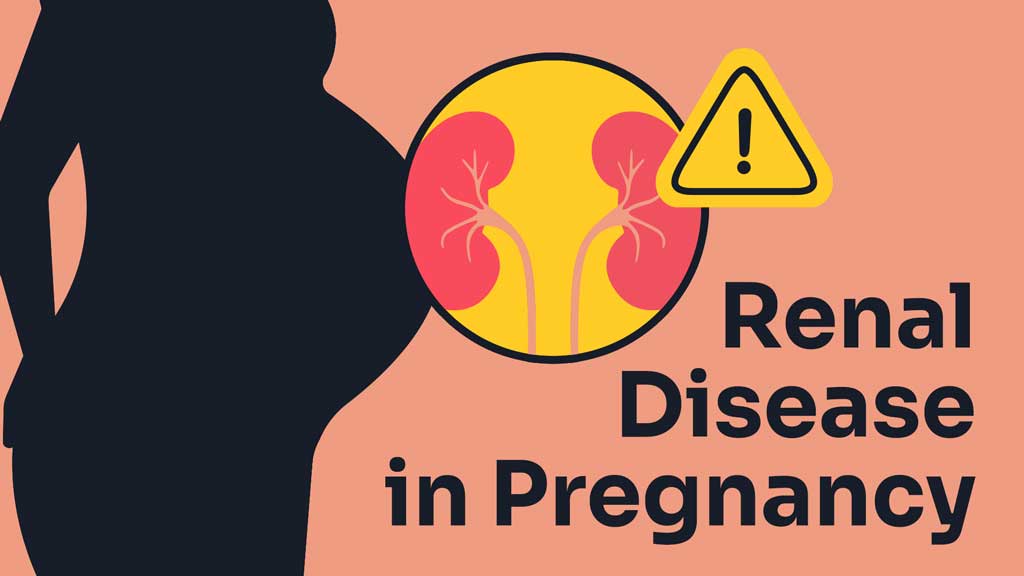Caring for patients with renal disease in pregnancy is becoming an increasingly important aspect of midwifery care.
Current estimates suggest that chronic kidney disease affects about 3% of pregnancies in high-income countries, with predictions that this percentage is likely to rise in the future alongside increasing maternal age and obesity (Wiles et al. 2019).
Depending on the severity of the disease, routine antenatal care may need to be coordinated with specialist renal care. By taking an interprofessional approach, adequate and timely monitoring can be offered to ensure the safety of both the pregnant person and the developing fetus. This usually includes:
- Monitoring the increased physiological demands on the kidney
- Watching for signs of disease progression
- Minimising the risk of complications such as pre-eclampsia.
(Gonzalez Suarez et al. 2019)
Despite offering combined care, Safi et al. (2019) suggest that the ability to provide optimal care for pregnant renal patients in Australia is often hindered by a lack of understanding of the prevalence, management and outcomes of people with serious kidney disease in pregnancy.
Typically, renal disease during pregnancy is either related to pre-existing disease or develops secondary to diseases of pregnancy. Either way, it can present some heightened risks to the wellbeing of both the mother and fetus (Balofsky & Fedarau 2016). For example, the following outcomes are all more common in people with renal disease:
- Pre-eclampsia
- Fetal growth restriction
- Preterm delivery
- Accelerated loss of maternal renal function
- Pregnancy-induced hypertension
- Induction of labour
- Caesarean birth
- Neonatal intensive care admission.
(Wiles et al. 2019; Fitzpatrick et al. 2019)
Testing for Proteinuria in Pregnancy

Proteinuria in the first trimester of pregnancy can indicate the presence of underlying kidney disease (Krane 2023).
Proteinuria is screened for using a urinary dipstick and if suspected, can be quantified via spot urine protein to creatinine ratio (uPCR) (ALEC 2024; Queensland Health 2021).
Generally, a uPCR equal to or greater than 30 mg/mmol is indicative of proteinuria in pregnancy (Queensland Health 2021).
Predicting Pregnancy Outcomes
Predicting specific outcomes for pregnant patients with renal disease can be difficult. In general, those with chronic renal disease adapt poorly to a gestational increase in renal blood flow, which may, in turn, heighten a decline in renal function and lead to a poor pregnancy outcome. In people with pre-existing kidney disease, pregnancy-related outcomes depend upon the degree of renal impairment, the amount of proteinuria and the severity of hypertension (Wiles et al. 2019).
The following factors have a large role to play in determining the wellbeing of both the pregnant person and the baby:
- The degree of renal impairment
- The presence of chronic hypertension
- The presence of proteinuria
- Underlying renal pathology.
(Krane 2023)
Chronic kidney disease often worsens during pregnancy due to the anatomical and physiological changes that occur from early gestation and increase the renal workload. For example, the glomerular filtration rate can increase by up to 50%, with a commensurate fall in serum creatinine levels secondary to plasma volume expansion, renal vasodilation and hyperfiltration (Jesudason et al. 2016).
In the first trimester of pregnancy, acute kidney injury can also be caused by hyperemesis gravidarum, ectopic pregnancy or miscarriage. In the second and third trimesters, however, the most common cause of acute kidney injury is severe pre-eclampsia (Jim & Garovic 2017).
Whatever the underlying cause, treatment of renal disease during pregnancy tends to be managed by an interprofessional team with a focus on supportive measures rather than on drug therapy, which could potentially harm fetal development. The goal, as Balofsky and Fedarau (2016) state, is always to prolong pregnancy until delivery is deemed safe.
Preconception Care
To minimise any potential harms during pregnancy, specialist care should ideally begin with pre-pregnancy counselling.
As Wiles et al. (2019) point out, treatment and pre-pregnancy counselling are essential to help patients make informed decisions and allow time to ensure optimal renal function and stable blood pressure before conception.
Pregnancy and Postnatal Care

During the pregnancy itself, additional challenges such as maintaining appropriate fluid balance often arise. For example, dehydration can cause acute kidney injury, especially for those with underlying chronic kidney disease, whereas fluid overload can cause pulmonary oedema, especially in people who have superimposed pre-eclampsia (NICE 2019).
Regular blood pressure monitoring is also essential, with a general recommendation that blood pressure should be maintained at no higher than 140/90 mmHg for the duration of the pregnancy (Wiles et al. 2019).
Following delivery, interprofessional care should be maintained and patients should ideally be seen at a combined postnatal clinic before returning to continued care with their established nephrology team.
Taking an Interprofessional Approach
Taking an interprofessional approach is key to the successful management of renal disease in pregnancy, but there are relatively few studies exploring care from the patient’s perspective. This information could be of great value in guiding clinical approaches to pre-pregnancy counselling.
In order to address this knowledge gap, Jesudason et al. (2016) performed a systematic review of 15 qualitative studies based on 257 women with renal disease. Common themes were identified, including:
- A strong desire to fulfil motherhood
- Guilt at failure to meet societal expectations
- Fear of birth defects and fetal harm
- Emotional conflict in decision-making
- Fears of exacerbating the disease
- Issues around control and determination.
A fundamental concern arising out of these studies was the patient’s distress at the focus on negative outcomes, and perceived discouragement and judgment by medical professionals, together with feelings of a lack of ownership in the decision-making process. In contrast, significant hope was reported when a positive attitude was shown by clinicians. In other words, these studies all flagged the importance of sensitive preconception counselling that embraces shared decision-making and acknowledges the patient’s goals and priorities.
As Safi et al. (2019) point out, there are currently no guidelines or policies to facilitate the delivery of specialised pregnancy care to people with renal disease in Australia, suggesting that further research studies are needed to help guide and inform current practice.
With preconception counselling and interprofessional care in place, patients with mild renal disease can do well in pregnancy. For those with moderate to severe kidney dysfunction, however, the outlook is less promising and many face the prospect of pregnancy-related complications as well as long-term renal deterioration (Kapoor et al. 2019).

Conclusion
The challenging nature of these pregnancies underscores just how important pre-pregnancy planning can be. As Wiles et al. (2019) say, although chronic kidney disease is not a barrier to pregnancy in most people, the risk of adverse pregnancy outcomes can be increased significantly. Pre-eclampsia, restricted fetal growth, pre-term delivery and accelerated loss of maternal renal function are all common complications that must be considered when planning a pregnancy.
As Hewawasam et al. (2020) suggest, achieving parenthood can be difficult for these patients, especially those who are receiving some form of renal replacement therapy for end-stage kidney disease. The presence of pre-existing chronic renal disease of any stage can have an adverse effect on maternal and perinatal outcomes, and although it’s not a barrier to pregnancy, the risk of complications and adverse outcomes is significant. For midwives, awareness of these risks can help them to provide sensitive, well-coordinated care for the whole family, building on the understandings achieved during pre-pregnancy counselling.
Test Your Knowledge
Question 1 of 3
What is the estimated prevalence of chronic kidney disease (CKD) in pregnancies in high-income countries?
Topics
References
- Australian Living Evidence Collaboration 2024, Australian Pregnancy Care Guidelines, ALEC, viewed 8 November 2024, https://app.magicapp.org/?language=hr#/guideline/jm83RE
- Balofsky, A & Fedarau, M 2016, ‘Renal Failure in Pregnancy’, Critical Care Clinics, vol. 32, no. 1, pp.73-83, viewed 8 November 2024, https://www.criticalcare.theclinics.com/article/S0749-0704(15)00075-5/abstract
- Fitzpatrick, A, Venugopal, K, Scheil, W, McDonald, SP & Jesudason, S 2019, ‘The Spectrum of Adverse Pregnancy Outcomes Based on Kidney Disease Diagnoses: A 20-Year Population Study’, American Journal of Nephrology, vol. 49, no. 5, viewed 7 November 2024, https://www.karger.com/Article/Abstract/499965
- Gonzalez Suarez, ML, Kattah, A, Grande, JP & Garovic, V 2019, ‘Renal Disorders in Pregnancy: Core Curriculum 2019’, American Journal of Kidney Diseases, vol. 73, no. 1, pp.119-130, viewed 7 November 2024, https://www.ajkd.org/article/S0272-6386(18)30770-4/fulltext
- Hewawasam, E, Gulyani, A, Davies, CE, Sullivan, E et al. 2020, ‘Parenthood and Pregnancy in Australians Receiving Treatment for End-Stage Kidney Disease: Protocol of a National Study of Perinatal and Parental Outcomes Through Population Record Linkage’, BMJ Open, vol. 10, no. 5, p.e036329, viewed 8 November 2024, https://bmjopen.bmj.com/content/10/5/e036329
- Jesudason, S, Mohammadi, F & Fitzpatrick, A 2016, ‘Managing Pregnancy in Chronic Kidney Disease: Improving Outcomes for Mother and Baby’, International Journal of Women's Health, vol. 8, pp. 273-285, viewed 8 November 2024, https://pmc.ncbi.nlm.nih.gov/articles/PMC4948734/
- Jim, B & Garovic, V D 2017, ‘Acute Kidney Injury in Pregnancy’, Semin Nephrol., vol. 37, no. 4, viewed 8 November 2024, https://www.ncbi.nlm.nih.gov/pmc/articles/PMC5662118/
- Krane, NK 2023, Kidney Disease and Pregnancy, Medscape, viewed 8 November 2024, https://emedicine.medscape.com/article/246123-overview#a1
- National Institute for Health and Care Excellence 2019, Intrapartum Care for Women With Existing Medical Conditions or Obstetric Complications and Their Babies, NICE, viewed 8 November 2024, https://www.nice.org.uk/guidance/ng121
- Queensland Health 2021, Queensland Clinical Guideline: Hypertension and Pregnancy, Queensland Government, viewed 8 November 2024, https://www.health.qld.gov.au/__data/assets/pdf_file/0034/139948/g-hdp.pdf
- Safi, N, Sullivan, E, Li, Z, Brown, M et al. 2019, ‘Serious Kidney Disease in Pregnancy: An Australian National Cohort Study Protocol’, BMC Nephrology, vol. 20, no. 1, viewed 7 November 2024, https://bmcnephrol.biomedcentral.com/articles/10.1186/s12882-019-1393-z
- Wiles, K, Chappell, L, Clark, K et al. 2019, ‘Clinical Practice Guideline on Pregnancy and Renal Disease’, BMC Nephrology, vol. 20, no. 1, viewed 7 November 2024, https://www.ncbi.nlm.nih.gov/pmc/articles/PMC6822421/
 New
New 
